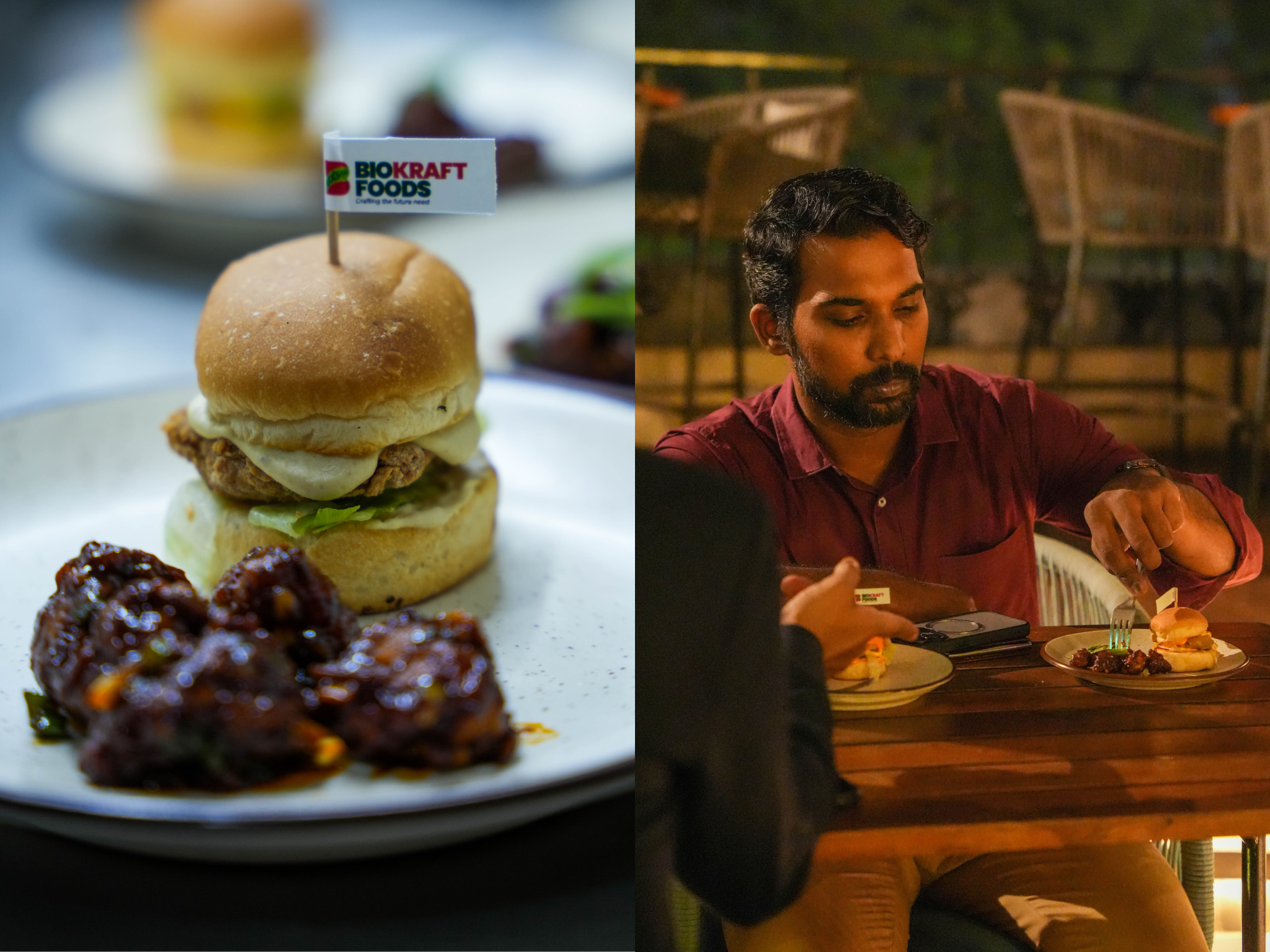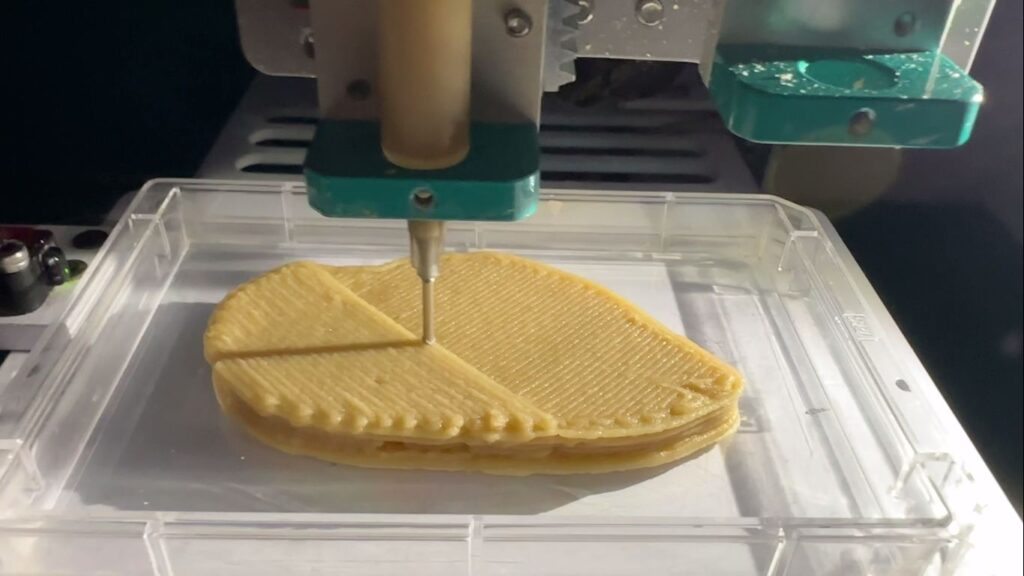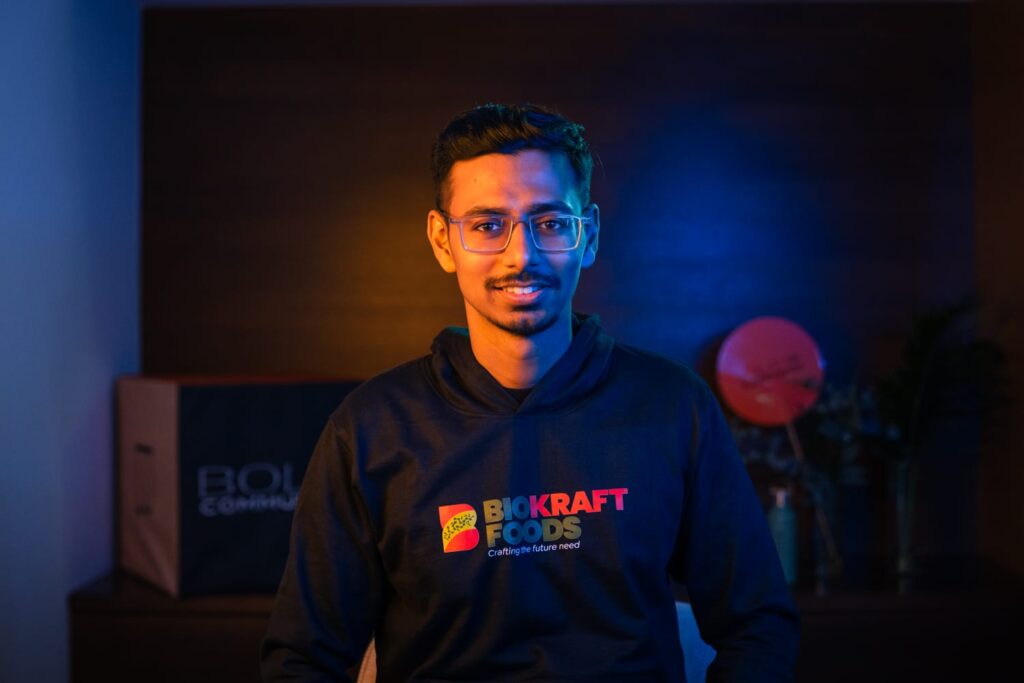
Mumbai-based startup Biokraft Foods hosted India’s first formal tasting of cultivated meat last week, presenting a hybrid chicken it hopes to launch next year.
Amid a welcoming biotech environment and increasing regulatory clarity, Indian startup Biokraft Foods signalled the country’s appetite for novel foods at a showcase for its cultivated chicken.
Over 30 sector leaders, sustainability advocates, and members of industry groups attended what was India’s first public tasting for cultivated meat, marking a milestone development for the future of food in the world’s most populous country.
The event was a precursor for Biokraft Foods’s market launch, which it indicates could come as soon as next year. The company is “optimistic” about the timeline since it’s already working closely with the Food Safety Standards Authority of India (FSSAI).
“Currently, cultivated meat will go through the novel and non-specified product route, as recently clarified by FSSAI officials. We are preparing our regulatory dossier to par with the available data from regulatory approved companies,” Biokraft Foods founder and CEO Kamalnayan Tibrewal tells Green Queen.
“We understand the ball has to be rolled by being the first company in India to start the work by regulatory officials in this space,” he adds. “Also, officials have clarified if the company and product meet all the standards, the approval process won’t take more than six to eight months.”
Combining chicken cells with plants and algae

Tibrewal is an alum of the Institute of Chemical Technology (ICT) in Mumbai, as well as the Good Food Institute’s (GFI) Smart Protein Project in the city. He established Biokraft Foods in 2023, supported by leading incubator programmes from ICT Mumbai, SP-TBI, and iCreate.
At the tasting, members of GFI India, Peta India, the Chamber for Advancement of Small & Medium Businesses (CASMB), Brinc, the Youth Organization in Defense of Animals India, and India Animal Fund (among others) tried Biokraft Foods’s cultivated chicken as part of slider burgers and chilli chicken, an Indo-Chinese classic.
The startup employs an advanced 3D bioprinting technology to make its cultivated chicken, marrying it with precision engineering and cellular biology to replicate the structure, taste, texture and nutritional profile of conventional chicken.
“We have developed our in-house proprietary bioink that contains all the ingredients required to achieve chicken meat’s essential sensory and physical properties. We use 3D bioprinting to fabricate the final chicken breast structures,” explains Tibrewal.
Asked about the product’s composition, he adds: “We are primarily working on chicken breasts made from certain plant-based and algal-based biopolymers in addition to chicken cells.”
Biokraft Foods will soon validate more SKUs, according to Tibrewal. “We are beyond thrilled to host this landmark event and introduce cultivated chicken meat to India. This is not just a milestone for Biokraft Foods, but a leap forward for sustainable food innovation in the country,” he says. “The overwhelmingly positive feedback we received fuels our commitment to redefine how meat is produced.”
The firm is to organise more tasting events to reach a broader audience and expand external validation, allowing both consumers and industry professionals to experience cultivated meat and provide valuable feedback to refine the product.
Priced the same as premium chicken

India may be known as a meat-free haven, being home to the world’s largest vegetarian population, but even so, at least 60% of its citizens eat meat. And chicken is by far the most popular among those people.
But as a nation whose food habits are increasingly being dictated by health, its residents seem open to novel foods. Nutrition is already driving greater consumption of plant proteins, but they’re also receptive to cultivated meat, as a survey showed in March. It found that over 60% of Indians are willing to buy cultivated meat, with 59% identifying it as an alternative to conventional meat that promotes nutritional security.
One key barrier, as is the case in other countries too, will be the cost of cultivated meat. This has been a major bottleneck for startups around the world, and is critical to wider adoption of these proteins.
“Our product would be competitively priced to meet the demands of the Horeca [hotels, restaurants, and catering] sector,” Tibrewal reveals. “For a general Indian consumer market, chicken meat is available for around ₹150-250 ($1.75-2.95) per kg, and for a B2B market, it is priced between ₹300-600 ($3.50-7) per kg, given the premium involved.
“So, our target pricing is between ₹300-350 ($3.50-4.10) per kg, which will be good to go for the B2B market,” he says. This could be viable, considering that 46% of respondents to the aforementioned survey are willing to pay a 10-30% premium on cultivated meat.
The startup is also planning to set up an independent R&D and production facility by the end of 2025, which will further help streamline its costs.
Biokraft Foods to close pre-seed funding round soon

Progress for India’s cultivated meat sector has sped up this year. The FSSAI has reportedly been looking to develop a regulatory framework for cultivated meat and seafood products, confirming that it would work with the government’s Department of Biotechnology and Biotechnology Industry Research Assistance Council on the same at a regulatory conclave in April.
India’s health minister, JP Nadda, stressed the importance of setting up the framework at a food safety summit in September. And last month, the government was urged to set clear regulatory guidelines for these alternative proteins.
Government bodies have invested in this space, too, with multiple research grants for cultivated meat from the Ministry of Science and Technology. Meanwhile, ICAR-Central Marine Fisheries Research Institute and New Delhi-based startup Neat Meatt are co-developing cultivated seafood, and Biokraft Foods itself is working with the ICAR-Directorate of Coldwater Fisheries Research on a similar project.
The opportunity for cultivated seafood has also attracted Singaporean pioneer Umami Bioworks, which has established R&D and commercialisation partnerships with two research hubs in India. One of them, the Centre for Smart Protein and Sustainable Material Innovation, was opened in May in Bengaluru, the same week the Alternative Proteins Innovation Center was launched in the city,
Biokfraft Foods, which has been backed by several government grants, is now in the middle of a pre-seed funding round, which is expected to close “very soon”, says Tibrewal.
Speaking after the tasting, CASMB president Nilesh Lele – a strategic advisor to the company – said: “Biokraft Foods is at the forefront of cultivated meat innovation, and this event underscores their potential to revolutionize the industry. I’m confident that Biokraft will not only lead in this space but also put India on the global map for sustainable food technology. This is just the beginning.”
The post India Hosts First Public Tasting for Cultivated Meat in Bid for 2025 Launch appeared first on Green Queen.
This post was originally published on Green Queen.